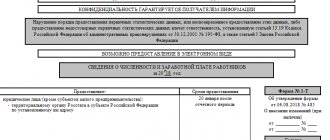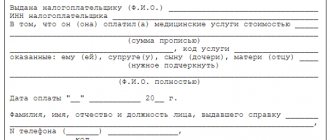Under what circumstances does the basis arise for registering an organization or individual entrepreneur as a payer of mineral extraction tax? How is this procedure carried out? Is an organization (entrepreneur) subject to registration as a mineral extraction tax payer if the use of subsoil is not related to the extraction of minerals that are subject to this tax? Should a subsoil user submit a tax return for mineral extraction tax to the tax authority with which he is registered as a payer of this tax? (This article does not address the issue of registering taxpayers when implementing production sharing agreements).
What is tax accounting?
The system for collecting information about what income and expenses were received in a business in a certain period is called tax accounting (TA). In addition to collecting, this system also systematizes data to determine the tax base and clarify what income tax the company will have to pay. The calculation is carried out depending on what system the company or individual entrepreneur uses. For example, if a general taxation system is used, income tax is calculated, and if the simplified tax system is used, then the base is calculated according to a simplified scheme.
If the data is collected, it is used by organizations or individual entrepreneurs to correctly draw up reports, and then transfer them to the Federal Tax Service. At the same time, tax authorities must check whether the tax has been calculated correctly and whether the transmitted data is reliable. When this is done, you can begin collecting tax according to NU.
Sometimes NU is confused with the accounting type of reporting. The essence of tax accounting is to pay taxes correctly, since they are determined precisely on its basis. Whereas accounting simply describes the financial side of the company's work and the state of affairs at a certain moment. Due to the confusion that arises if these two concepts are replaced, serious problems can arise, including discrepancies in profits, which are subject to tax. Therefore, many try to minimize the difference between the tax and accounting reports.
The procedure for recording organizations and individuals
The current procedure for tax accounting of individuals and legal entities is established by tax legislation, in particular, Article 83 of the Tax Code of the Russian Federation. The initial stage of accounting is the application of the interested person to the tax authority located at the place of his registration, or the location of the organization, and submission of a written application according to the established form.
Legal entities, in addition to the application, must submit additional documents, a list of which can be obtained in advance from the tax authority.
All documents of the future taxpayer are accepted by an authorized employee, about which a corresponding note is made and a receipt is given. Next comes the verification of all submitted documents.
Registration must be carried out no later than 5 days after receipt of the application by authorized persons. Within the same period, the taxpayer must be sent a corresponding notification that registration has been completed.
At the immediate moment of registration, an individual or legal entity is assigned an individual taxpayer identification number.
This number is intended to ensure the most accurate accounting and control of the taxation procedure for individuals and legal entities. This number will contain all the most important information - the taxes the person pays, the presence or absence of debts, the payment procedure, the dates of previous tax payments, a list of the person’s official appeals to the tax authorities and other data.
In the future, the procedure for making changes to any calculation and accounting data, or registering additional taxable items, will begin with the main and mandatory stage - contacting the tax authority and submitting a corresponding written application by interested parties.
Tax accounting: what principles does it have?
Tax accounting (TA) has several important principles that you need to know:
- Monetary dimension. The essence of the principle under consideration states that all income and expenses must be expressed as a monetary amount.
- Property separation . The principle under consideration implies that for tax accounting, only the property of the organization is taken into account, and the property of other persons, even if they are part of the company in question, is considered separately.
- Subsequence . The essence of tax accounting in this principle comes down to the fact that the implementation of norms and rules is carried out according to chronology. That is, first they act for one period, and only after that they begin to act for another.
- Consistency. This principle means that records are kept continuously and without interruption, starting from the moment when the company was registered and ending with the time of its liquidation.
According to the current Tax Code, you can independently determine what choice to make in terms of tax reporting. This also applies to which taxation system to use.
Features of accounting for foreign organizations and individuals
A foreign organization is subject to mandatory registration by authorized persons if there are legal grounds for this.
Regarding the timing of accounting - absolutely the same rules apply for foreign organizations as for Russian ones - registration must be carried out within 5 days from the date the tax authority receives the relevant documents for calculations and a written application.
The application form for a foreign company will be slightly different from the usual one. This application, as well as the documents necessary for settlements, can be sent by interested parties by mail, with mandatory notification of receipt.
In addition, the package of documents must contain a certified copy of the identity document of the person who fully assumes responsibility for the completeness, literacy and accuracy of the information and calculations provided.
Also, a representative of a foreign company must provide legal grounds that will confirm the need for its registration with the Russian tax authority.
Tax accounting of foreign organizations is a separate branch of taxation. It is characterized by some features when establishing the procedure for calculating taxes, as well as other nuances provided for by the current legislation of the Russian Federation.
Author of the article
How tax accounting is carried out in individual entrepreneurs
Tax accounting of income is carried out according to certain principles, which are determined depending on the chosen taxation system that the entrepreneur selected at the time of registration of his activities. Typically, entrepreneurs prefer to choose the simplified tax system, since this system provides for a simplified taxation format. Although, before dwelling on the option under consideration, it should be remembered that this format does not always provide for the possibility of using it. For example, some activities will not benefit from a simple schema. In particular, this applies to the following areas:
- Banking region;
- Areas of insurance;
- When opening pawn shops;
- When creating companies whose area of activity is in the gambling business.
If an individual entrepreneur cannot settle on the simplified tax system, he can use another popular system - UTII or OSNO. In addition, the patent system can be used. In any case, so that you can keep tax records (TA)? you must select one of the proposed options. If this is not done, the individual entrepreneur will initially work on OSNO - one of the most complex and unprofitable systems. And if you want to switch to an alternative option, you will have to wait until next year.
How to keep tax records for an LLC
Tax accounting in 2022 for LLCs is usually carried out by specialists . This is due to the fact that the activities of an LLC are much more complex and multifaceted than those of an individual entrepreneur. Accordingly, there are many more taxes that have to be monitored for payment. Not to mention maintaining documentation, including reporting, which will be transferred to the Federal Tax Service.
The system by which tax accounting will be maintained is also selected at the beginning of the company's activities. The director can do this. The choice, as in the previous case, is to choose one of the systems proposed by the state. In order to figure out which option to choose, we will consider each separately.
- BASIC. Tax accounting is carried out in several directions. In particular, every quarter you need to submit a VAT report and pay 18% as part of the same tax. Also pay income tax (20% every month or quarter), on company property (there is a local tariff, which should not be higher than 2.2% and is paid once a year), transport and land tax (if the company is the owner of land and transport ). In addition, tax accounting is also carried out on employee salaries (from 13% to 30% of each salary, and you will also have to submit a 2-NDFL certificate every year, and a 6-NDFL certificate every quarter). In addition, you need to pay insurance premiums for employees.
- USN. If you choose this system, you will not have to pay VAT and income taxes. But what is relevant is the land/transport tax, as well as the single tax of 6%. The declaration must be submitted every year. Tax is paid on the salaries of employees, as well as insurance contributions on them (form 4-FSS is transferred to the FSS - Social Insurance Fund).
- UTII. As in the previous case, you need to pay a single tax at an individual rate, but you will be exempt from some others. Although you will still have to keep tax records of your income, this frees you from unnecessary paperwork. You will only pay contributions for insurance, taxes on employee salaries, as well as on property, transport and land.
To properly maintain tax records in 2022, you need to take into account the features of each option considered.
Deadlines for registering separate divisions with the tax authority
Article 83 of the Tax Code of the Russian Federation contains an indication that legal entities that have separate subdivisions (SBs) in the constituent entities of the Russian Federation must register for taxation with the Federal Tax Service at the territorial location of each of the SBs. A legal entity is obliged to inform the tax authorities at its place of residence about the creation of an OP. In this case, it does not matter which Federal Tax Service has jurisdiction over the territory in which the OP was created.
A legal entity must send a notification to the Federal Tax Service about the creation of an OP. After this, the legal entity will be registered with the tax authorities in the subject of its location, provided that they are not its representative offices or branches. (clause 4 of article 83, subclause 3 of clause 2 of article 23 of the Tax Code of the Russian Federation). The form of such a document was approved by order of the Federal Tax Service of Russia dated June 9, 2011 No. ММВ-7-6/ [email protected]
The legislation allows a period of one month to provide the Federal Tax Service with a notification about the creation of an OP. According to paragraph 6 of Art. 6.1, clause 2 of Article 84 of the Tax Code of the Russian Federation, representatives of tax authorities register the organization at the location of its OP within a period not exceeding five working days after receiving the message. The document confirming the fact of registration is the notification of registration.
Starting from February 1, 2008, legal entities are exempt from the obligation to submit an application for tax registration in the territory of the OP location. Registration is carried out automatically by the Federal Tax Service on the basis of information provided by a legal entity (clause 3, clause 2, article 23 of the Tax Code of the Russian Federation) within a period of 5 days from the date of receipt of this information (clause 4, article 83, clause 2 Article 84 of the Tax Code of the Russian Federation). So, the organization must, within a month from the moment of creation of the OP, send a message about this to the Federal Tax Service of the subject in which it is located.
It should be noted that a legal entity must also, within a period of one month, notify in writing about the creation of an OP to the authorities monitoring the payment of insurance premiums. This is done at the location of the company (clause 2, part 3, article 28 of the Federal Law of July 24, 2009 No. 212-FZ “On insurance contributions to the Pension Fund of the Russian Federation, the Social Insurance Fund of the Russian Federation, the Federal Compulsory Medical Insurance Fund”, further – Law No. 212-FZ).
Letter of the Ministry of Health and Social Development of Russia dated September 9, 2010 No. 2891-19 contains an indication of the fact that an organization is obliged to report the creation of an OP, regardless of whether it has a separate balance sheet, current account and mutual settlements with individuals.
The following government bodies control the timely payment of insurance payments:
- The Pension Fund of the Russian Federation and its territorial divisions in relation to insurance contributions for compulsory pension insurance paid to the Pension Fund and insurance contributions for compulsory medical insurance paid to the FFOMS;
- The Social Insurance Fund and its territorial divisions in relation to insurance payments for compulsory social insurance in case of temporary disability and in connection with maternity paid to the Social Insurance Fund of Russia.
Notification of the creation of an OP can be provided to the body monitoring the payment of insurance premiums at the location of the legal entity in free form, since the law does not approve a single form.
Is it difficult to understand everything and not make mistakes when communicating with the tax office? Seek help from professionals.
How we are working? Services. Primary audit. Agreement.
What tax reports does the LLC submit:
| Mode | Reporting type | Frequency of delivery | When and how often to take it |
| General taxation system | VAT declaration | Quarterly | Until the 25th day following the end of the quarter |
| Income tax return | Quarterly | Until the 28th day following the end of the quarter | |
| Unified calculation of insurance premiums (ERSV) | Quarterly | Until the 30th day following the end of the quarter | |
| Simplified taxation system | Declaration according to the simplified tax system | Annually | Until April 30 next year |
| Unified calculation of insurance premiums (ERSV) | Quarterly | Until the 30th day following the end of the quarter |
Tax registration
A tax registration certificate can be obtained within 5 days after application . Tax registration is carried out based on the place of residence/opening of the company. In order for tax registration to be carried out, first the company or individual entrepreneur must be registered in the Unified State Register of Legal Entities/Unified State Register of Individual Entrepreneurs. When there is a record that the company has been created, you can apply to obtain a certificate of registration.
Please note that tax registration certificates are also issued to branches, depending on the area where they are located. To receive it, you must provide a certificate of registration of the LLC, extracts from the Unified State Register of Legal Entities and papers for the branch.
Conditions for registering organizations and individuals
Registration of both individuals and organizations can be carried out only if these persons have complied with all the necessary conditions and procedures provided for by the norms of the current tax legislation.
The main conditions include: reaching the required age, full legal capacity, availability of all necessary documents from individuals or organizations.
Legal entities must also submit the full procedure for the calculations made, as well as other accounting documents required by an authorized representative of the tax authority.
After receiving the required package of documents, the tax authority verifies the submitted data and checks them as thoroughly as possible.
Often, documents are returned back to the applicant to correct any errors or inaccuracies, as well as to indicate additional information that was not included in the submitted papers.
The organization will be registered only if the future taxpayer can correctly and competently fill out all the necessary documents, collect the required certificates in a timely manner and provide other information if such a need arises. Otherwise, the interested person’s demands for tax registration may be rejected, indicating specific reasons.
How to register for taxes and obtain a certificate of registration
There are several ways to register taxes:
- Online registration on the tax website;
- Sending documents by registered mail;
- Contact the nearest MFC;
- Personal visit to the Federal Tax Service to register with the tax authority.
The fastest way to contact us is in person. Having received the documents, they will be checked and confirmation of data will be requested. When everything is confirmed, they will register with the tax authority and issue a certificate.
When is an organization required to register with the tax office?
Tax registration of any legal entity must be carried out from its very inception. Please note that this responsibility does not depend on whether the enterprise carries out activities and whether it has to pay taxes and contributions. Tax service employees will independently send to extra-budgetary funds all the information necessary for tax registration. Thus, the company should not be involved in submitting data to pension, health and social insurance funds.
This rule does not apply to tax registration of separate divisions that themselves conduct settlements with personnel and pay wages to employees.
While an organization is carrying out its activities, it can apply to the tax office for registration several times. There are different reasons for registration, namely:
- the organization is just being created;
- acquires the status of the largest taxpayer;
- opens a separate division;
- begins to operate in the gambling business;
- buys or receives real estate and/or vehicles;
- switches to UTII, if possible;
- begins development of a subsoil plot on the basis of a use license in the presence of a production sharing agreement with the state;
- has become one of the responsible members of a consolidated group of taxpayers or enters into an investment partnership agreement.
Tax accounting (TA): what are its functions?
Registration with the tax authority is a necessity that carries certain functions:
- Fiscal. The state budget is replenished, which helps to conduct business.
- Informational. Promotes the timely receipt of information from the taxpayer to the tax office and vice versa. Typically this information relates to the accuracy of deductions, fees and charges.
- Test. Monitors tax accounting to ensure comparable figures.
Performing these functions helps to normalize the operation of the entire system.
You can get legal assistance on tax accounting issues on our website.
Grounds for registration
By virtue of paragraphs. 2 p. 1 art. 23 of the Tax Code of the Russian Federation, taxpayers are required to register with the tax authorities, if such an obligation is provided for by the Tax Code. Based on paragraph 1 of Art. 83 of the Tax Code of the Russian Federation, organizations and individuals are subject to registration with the tax authorities, respectively:
- at the location of the organization;
- at the location of its separate divisions;
- at the place of residence of the individual;
- at the location of their real estate and vehicles;
- on other grounds provided for by the Tax Code. These grounds, in particular, include the presence of an organization or individual entrepreneur in the use of a subsoil plot. According to clauses 1 , 2 of Art. 335 of the Tax Code of the Russian Federation, payers of mineral extraction tax are subject to registration as such:
1) at the location of the subsoil plot provided to the taxpayer for use.
The location of such a site is recognized as the territory of the subject (subjects) of the Russian Federation on which the subsoil plot is located; 2) at the location of the organization (place of residence of the individual). Registration at the location (residence) of the taxpayer is carried out if mining is carried out on a subsoil plot provided to the taxpayer for use, located:
- on the continental shelf of the Russian Federation (includes the seabed and subsoil of underwater areas located outside the territorial sea of the Russian Federation throughout the natural continuation of its land territory to the outer boundary of the underwater edge of the continent);
- in the exclusive economic zone of the Russian Federation. Such a zone is recognized as a maritime area located outside the territorial sea of the Russian Federation and adjacent to it, with a special legal regime established by a special law, international treaties of the Russian Federation and norms of international law;
- outside the territory of the Russian Federation in territories under the jurisdiction of the Russian Federation or leased from foreign states or used on the basis of an international treaty.
Let's figure out under what circumstances it is considered that a subsoil plot has been granted for use. The procedure for using subsoil in the Russian Federation and the relations arising in connection with their use are regulated by the norms of the Law on Subsoil .
Based on Art. 9 of this law, the rights and obligations of the subsoil user arise from the date of state registration of the license to use the subsoil plot. It is a license that is a document certifying the right of its owner to use a subsoil plot within certain boundaries in accordance with the purpose specified in it for a specified period, subject to the owner’s compliance with pre-agreed conditions ( Article 11 of the Subsoil Law ). Consequently, the only criterion for giving an organization or individual entrepreneur the status of a mineral extraction tax payer and the basis for registration as such is the presence of a license to use subsoil. (This is also confirmed by the fact that registration is carried out within 30 calendar days from the date of state registration of the license (permit) for the use of a subsoil plot ( clause 1 of Article 335 of the Tax Code of the Russian Federation ).) Moreover, the need for registration is not affected by the above the license contains the intended purpose of the permitted work. This means that the subsoil user is subject to registration as a mineral extraction tax payer when carrying out any type of subsoil use, including that which does not result in the extraction of mineral resources, which is subject to mineral extraction tax (letters of the Federal Tax Service of the Russian Federation dated December 6, 2013 No. GD- 4-3/22016 , Ministry of Finance of the Russian Federation dated 10/08/2013 No. 03-06-05-01/41901 ).
Types of subsoil use are listed in Art. 6 of the Law on Subsoil . Subsoil is provided for use:
1) for regional geological study, including:
- regional geological and geophysical work;
- geological survey;
- engineering-geological surveys;
- scientific research, paleontological and other work aimed at the general geological study of the subsoil;
- geological work on forecasting earthquakes and studying volcanic activity, creating and maintaining monitoring of the state of the subsoil, monitoring the regime of groundwater;
- other work carried out without significantly damaging the integrity of the subsoil;
2) for geological study, including the search and assessment of mineral deposits, as well as for geological study and assessment of the suitability of subsoil areas for the construction and operation of underground structures not related to mining;
3) for exploration and extraction of mineral resources, including the use of waste from mining production and related processing industries;
4) for the construction and operation of underground structures not related to mining;
5) for the formation of specially protected geological objects that have scientific, cultural, aesthetic, sanitary, health and other significance (scientific and educational sites, geological reserves, wildlife sanctuaries, natural monuments, caves and other underground cavities);
6) for collecting mineralogical, paleontological and other geological collection materials.







